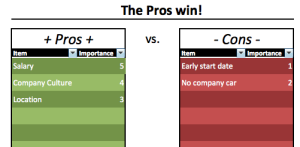
One of the key secrets to success in the workplace is having good time management skills.
In fact, most human resource managers look for this particular skill in new applicants.
Karen Trepte wrote in her Huffington Post blog post about why time management is so important, as it not only helps people at work but in all aspects of life.
“[Time management is] something we can use to enrich our lives. We can learn to control our thoughts, we can learn to control our time, and we can learn to control what we focus on,” Trepte wrote. “Use time management as a way to be the manager of yourself.”
Although it’s easy to become overwhelmed and stressed with deadlines and other tasks at work, time management is the only way to boost productivity, enhance work experience, and alleviate pressure in the office.
Read on below to find out how you can improve your time management skills for greater success at work.
1. Clear vision and goals
The initial step in managing time effectively is by having a clear vision and attainable goals. Developing the right mindset and attitude sets the stage for building effective time management habits and discipline.
The first stage is having a clear vision, which will determine what you must do today to be able to achieve what you want to do tomorrow.
The next step is goal setting, which is an important trait at any job. For example, many successful traders have to set goals to prosper, according to a post by FXCM.
This helps professionals understand their strengths, what they want to achieve, and align their goals based on their personality.
Then follow the SMART guidelines published by Time Management Guide to help you increase the odds of achieving your goals much like the aforementioned goal-orientated jobs such as trading.
2. Communicate effectively
You must be able to effectively convey your thoughts to your colleagues and managers, whether in person or via email. This will help you cut the time wasted on explaining through multiple email threads.
The best way to communicate effectively is by listening to them and encouraging a two-way feedback in each conversation.
This is a great skill that will help you move into a leadership position as it requires you to be open to receiving feedback from co-workers and reporting staff.
But, you must also be open to change by avoiding defensive responses and addressing concerns, especially those related to behavior.
3. Create a positive environment
Wouldn’t it be nice working in an office without feeling like you are working at all?
Although enjoying your work is helpful in ensuring you get more things done in a day, it has less to do with your actual job and more to do with your attitude towards it.
A Forbes contributing writer stated that many studies have proven only about one in five people really enjoy their jobs, with one in five actively disliking their work. The rest are fairly neutral about their profession.
The best way to enjoy your work is by creating a positive environment to motivate others to work harder for the success of the business.
4. Prioritizing
It’s easy to be distracted and overwhelmed with all the things that need to be done in a jiffy.
But the most important aspect of time management is knowing how to prioritize tasks.
It helps to make a to-do list to easily categorize each job and prioritize based on their urgency or importance.
When you are actively prioritizing each assignment, you will resolve pressing issues more efficiently, while ensuring that clients get their problems solved in time.
5. Never avoid the task at hand
Sometimes a project will come in that you are dreading working on. However it is important to avoid procrastinating so that you can move onto the next task.
Avoiding a particular assignment will only prolong the process and affect your productivity.
Approaching difficult assignments also shows your ability to be a problem solver, which is another trait that most employers look for, especially if you are aiming for a promotion.
It’s important to also weigh these problems as well. If a particular task looks unattainable or requires more time to be finished, then discuss it with your supervisors and find the best solution for all parties.
6. Break a big task into smaller ones
When you have a major project to finish, it’s often difficult to know where to start.
The best way to confront this is by taking the project and breaking it down into a few smaller tasks that you can complete without it becoming too stressful.
You won’t help yourself if you try to multi-task.
Trying to do multiple tasks at once usually leads you to stretching yourself too thin, and often not being able to devote enough time and focus to singular tasks.
Research published on Quick Base suggests that multitasking actually decreases productivity. It’s more effective to focus on each individual task separately to get things done more efficiently.
7. Use tech tools
Technology has provided us different ways to manage time effectively.
From apps that can be accessed on mobile devices to productivity software that makes work easier and faster, nothing is impossible with the aid of some of today’s most innovative tech solutions.
Lifehack discussed 15 different time management apps and tools you can take advantage of to support your day-to-day challenges that you’re faced with at work.
It’s essential to pick the right time management tools based on your needs and personal preference.
There are hundreds of apps out there that promise to counter procrastination and encourage productivity, but the best tool in managing time at work is the one that syncs everything in one place or dashboard to easily access all of the information you need at the click of a button.
To sum it up, time management is essential in enhancing productivity, efficiency, and effectiveness at work.
Whether you’re employed and are looking at enhancing your skills or you’re currently looking for a job, these tips will help you to prioritize and manage work with less stress and pressure.


